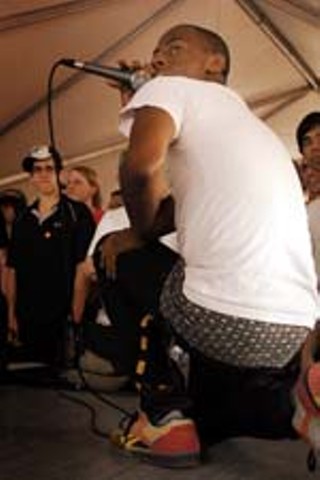The Cult of Pitchfork
How former record-store clerks and obsessive music nerds turned a Web site into a hit machine
By Audra Schroeder, Fri., Aug. 4, 2006

There's never an excuse, in 2006, for men to wear tiny gym shorts in public, even in blistering, dead-of-summer heat. But there they were: grown men dressed like extras from Meatballs and women dressed in spandex and Olivia Newton-John headbands milling about, pawing records, throwing out obscure band names, and talking about their "early stuff." This is Chicago's Union Park, where thousands of fans have converged for the Pitchfork Music Festival. As a young blond man walks past with the requisite messenger bag, sleeveless shirt, and neck bandana, a weird vortex appears, as if all the clichés have altered time and space, leaving only one question:
Q: How many indie rockers does it take to screw in a lightbulb?
A: Dozens. One to screw it in and all the rest to say the first guy sold out.
Sure, it's easy to joke about the current state of indie rock. When Lester Bangs wrote his 1974 essay "How to Be a Rock Critic," he was being not-so-subtle in his disgust, but his ecstatic jive was kind of true: "Anybody can do this shit, all it takes is a high level of unconsciousness ... and some ability to sling bullshit around. ... You don't even have to think it up, all you gotta do is invest in a slingshot."
The Giant Slingshot of Bullshit might not reach as far now, but it's only because the landscape has changed severely. Since the Seventies halcyon days of Creem and Rolling Stone, the Internet has become the hype machine, and the hype machine has become a necessary evil for indie music. With the increasing necessity of the Internet, an interesting thing has happened in the last six years or so. Regular folks, not grizzled music critics or professional writers, have been able to write about, and subsequently hype, bands they like, with ever-growing audiences.

It's now easier for bands to become familiar names among music blogs like Largehearted Boy (blog.largeheartedboy.com) and Stereogum (www.stereogum.com). The Dallas-based Gorilla vs. Bear (gorillavsbear.blogspot.com) sang the praises of local favorites like Voxtrot; Sound Team; and Tacks, the Boy Disaster for months, while former Austinite Matt Sonzala ignited Houston hip-hop with his HoustonSoReal blog (houstonsoreal.blogspot.com). MySpace.com has helped bands immensely in grassroots promotion, allowing audio samples, photos, and contacts all on one page, while magazines like Spin have become formulaic in their ever-glowing reviews, forcing music fans who find the Killers' album about as new and exciting as a box of saltines to find other avenues.
For better or worse, the Chicago-based music Web site PitchforkMedia.com has become part of the indie lexicon in the last few years, not only for their humorous, definitive, and sometimes-dense reviews (and the subsequent number-rating system), but also their ability to elevate certain bands to "buzz" status with a single 9.0 rating. Most recently, it was Minneapolis quartet Tapes 'n Tapes, but in the past, Broken Social Scene, Clap Your Hands Say Yeah, and Wolf Parade all experienced a steaming pile of Pitchforked praise. And while reviewers rarely give a perfect 10.0, that honor was bestowed upon our own Trail of Dead for 2002's Source Tags and Codes. Radiohead's Kid A also received a perfect 10, while former Dismemberment Plan singer Travis Morrison's album Travistan was slapped with a 0.0, along with Sonic Youth's NYC Ghosts & Flowers.
Coincidentally, hating on Pitchfork and their alleged elitism has also become a fevered activity on the ol' Interweb. A few years ago, Sub Pop, not the first label one associates with biting satire, ran a parody of the site, with one headline reading, "Pitchfork Staff Member Says 'Hi' to Real-Life Woman." The Web site SomethingAwful.com also produced a parody called "Rich Dork" (www.somethingawful.com/fake/richdork), with fawning reviews of every Radiohead album and a spoof on Pitchfork's ratings system ("6.0-6.9: Needs more white guitarists with black-rimmed glasses"). It's obvious the 'Fork has touched a nerve.
Founder Ryan Schreiber's vision of what Pitchfork could be was a modest one. While living with his parents in 1995, the 19-year-old record-store clerk started the Web site from the Schreibers' suburban Minneapolis home.
"The Web was really in its infancy then, and there really wasn't that much out there," says Schreiber. "This was the mid-Nineties zine-scene boom, and all my friends were doing them, so that kind of inspired me, as well as national magazines like Magnet, which were just starting up. But the Web seemed like the best option; there was no overhead, which was nice because I had no money. I had no writing experience whatsoever, but I was kind of an opinionated kid, and I just wanted a way to bring that music I liked to new listeners."
The site was initially updated monthly, and Schreiber, now 30, remembers some of the first reviews he wrote as "painfully embarrassing." Slowly, he brought a few other local writers on board for sporadic reviews. As Pitchfork shuffled their Chuck Taylors into the new millennium, reviews were stretched from the original 100 to 500 words, allowing for steel-toed (and often impenetrable) criticism as well as humor and bile. They do their share of gushing, however.

"When we really get behind something full force, it's something the entire staff is into," says Schreiber, who tends to get really excited when we talk. "Anything other than what we're really enthusiastic about tends to be just one writer's opinion. And sometimes, the staff is really into something that gets slammed, but that's the nature of criticism."
The site's overhead is kept at a minimum, being an online-only publication, and revenue comes entirely from the site's ads. While they won't reveal their numbers, it's obvious they're not doing too shabby. The site receives 150,000 to 170,000 unique visitors a day and has become a daily destination for discerning music fans. They currently offer five record reviews per day, live reviews, interviews, a blog-form news section, and weekly columns on everything from techno to hip-hop to the worst record covers of all time. But what does Schreiber think about the claim that their reviews make or break bands?
"I think the press gives us a little too much credit for that," he insists. "We get excited about a lot of stuff on the site, but very little goes on to get the acclaim that a band like Tapes 'n Tapes does. Ultimately, I think it depends on the quality of the band and whether they have the ability to connect with a lot of people."
"Pitchfork's relevance in breaking a new band can't be underestimated, but it's not the only way a band can break out," says Misra Records head Phil Waldorf. "Locally, Black Angels are a great example. Pitchfork gave them a positive review, but nothing out of the ordinary, essentially a C-plus. They're doing well on a national level in spite of not having Pitchfork's hype machine behind their debut. That's happening organically – radio, blogs, print media, word of mouth, and loads of touring. When I worked at Other Music in New York, there was always a segment of people who hated the shop's editorial grandstanding. But, ultimately, Other Music introduced more people to more new music than if they just stuffed their shelves full of records and said nothing at all. It's the same way with Pitchfork."
Schreiber remains unapologetic for the site's negative reviews, but shoots down the claim that they're a bunch of elitist, bloodthirsty, hipsters wielding slingshots of bullshit.
"As for us destroying bands' careers ... I would hope that's not the case, because that's not our intent," he says. "But no one agrees with us 100 percent of the time. Once you get into people-pleasing, you lose what makes it criticism."

The hype machine never rests. For the second year in a row, Pitchfork put together its own music fest in Chicago. Last year, it was known as the Intonation Festival, and roughly 30,000 people attended the two-day event, with big names including Pitchfork darlings the Wrens and the Decemberists. This year, they broke with Intonation and put their own name on it, bringing in the Silver Jews, Yo La Tengo, Destroyer, Mission of Burma, Spoon, and a reunited Os Mutantes.
Despite the temperature, Saturday's lineup was a fair one. There was a disconcerting amount of high-fives during Band of Horses' set, and singer Ben Bridwell's voice sounded strained. The Chicago Underground Duo totally smoked with a mix of free jazz and electro-xylophone beats. Destroyer's marvelous vibrato echoed off the waves of the community pool directly behind the Connector stage, as "European Oils" and "Looters' Follies" harmonized with screaming children. Unfortunately, mastermind Dan Bejar's live set didn't match the gilded fervor of his latest, Destroyer's Rubies, and would have felt much fuller in a smaller venue.
Spank Rock's barn burner on the smaller Biz 3 stage was perhaps the most pleasant surprise. In between the DJ sampling both the Seeds' "Can't Seem to Make You Mine" and the Beach Boys' "California Girls," Spank tore it up live, busting out oh-shit dance moves as he used his prowess in the Baltimore club scene to incite a full-scale dance party onstage that nearly cracked the floorboards. A handful of sweaty front-rowers also received shots of Ketel One poured directly into their mouths by one of Spank's crew. The Futureheads sounded surprisingly fierce and full with their Buzzcocks saw, and the Silver Jews' headlining spot was padded by guest Jesus Lizard guitarist Duane Denison and Bobby Bare Jr. on backup vocals. Frontman David Berman was in fine form as the massive crowd stood backlit by an ornate church. Opener "Punks in the Beerlight" was a perfect end to the day.
Sunday was better, although the gym shorts were even shorter. The disco strut of Brazilian sextet Cansei de Ser Sexy sounded 10 times as amplified as the singer bounced around in leopard-print spandex and dove into the crowd during the last song. The best part: hearing her say to the crowd in broken English, "You are all so beautiful! Can I have phone number?" Wilco drummer Glenn Kotche had the entire audience slackjawed as he beat the shit out of his kit and mic'd up a bunch of tiny boxes that made bird sounds, delving us all into some bizarre jungle-tribe dance.
Bass-heavy Mission of Burma sounded just as pissed and tight as they did 20 years ago, bolting through opener "That's How I Escaped My Certain Fate," "Academy Fight Song," "That's When I Reach for My Revolver," and a few from their latest, Obliterati. Spoon started off their dusk set with a new song, and after a few technical difficulties, Britt Daniel & Co. swaggered through "I Turn My Camera On" and "Jonathon Fisk" but failed to reach the gravitas and urgency that lifers Yo La Tengo had just an hour earlier. Their last song was around 20 minutes long – yes, a "jam," but good gravy, they did it up right.
The reunited Os Mutantes were the buzz of the weekend, and the fact that most of the people in the crowd weren't even born when the Brazilian trio originally began shaping its Tropicalia psych in the Sixties didn't stop random explosions of Woodstock-style dance. Featuring original brothers Sérgio Dias and Arnaldo Baptista, but minus Rita Lee, the Mutantes got all Godspell on us, plowing through the Caetano Veloso-penned, bittersweet "Baby" and fevered "Cantor de Mambo." (Highlight of the night: seeing fellow festival performer Devendra Banhart shirtless and ecstatically clutching a bottle of Maker's Mark during "Baby.") Closer "A Minha Menina," one of the few songs they sang in Portuguese, was an obvious choice, though the crowd was already heading toward the exit. Eight hours in the sun is just too much for some fragile indie rockers.
The fest's lineup was pretty solid, and, for the most part, the veteran bands were the ones that tore shit up old-school. However, for a Web site that supposedly tries to remain objective, almost all the acts on the bill had received good reviews from the site, raising a question of whether these bands will continue to get love from the 'Fork. Will Spoon's next album get slammed? Maybe not. It would have been nice to see a bit more diversity, more hip-hop or experimental, or a few bands that aren't on the radar just yet, but, well, that's Pitchfork's job as tastemaker. Hell, we'll give it a 7.5, even with the Great Gym Short Disaster of 2006.
Besides, everyone knows bike shorts are so the new gym shorts. ![]()







